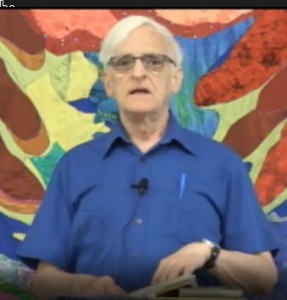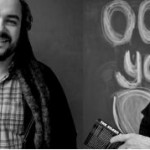
So – we’ve looked at Jesus’ deconstructing the false gods of his day. But why – what was the larger agenda, the larger vision, behind his actions?
The vision behind all his teaching, all his revolutionary words, was the Kingdom of God.
Now, everyone who heard the word Kingdom in his day knew it was politically wrapped. It was about this Kingdom of God, versus the Roman Empire, the kingdom under which they were living on a daily basis. Jesus was talking to a people who were not only oppressed but surrounded and occupied by the Romans.
And so this Kingdom of God was not about going to Heaven, but about an alternative to the entire apparatus that they saw daily as an occupied people: an apparatus that interfered in their religion, that interfered with their economy by its demands for taxes, and so much more.
So this of course, everyone agrees, was the heart of Jesus’ preaching the Kingdom.
The Kingdom, as Borg and Chilton agree, is the alternative way of wisdom, the subversive wisdom, a wisdom that puts justice first, puts the poor out front, and does not settle for the rich getting richer and the poor getting poorer and greater in number and more oppressed. Jesus does not settle for that.
Chilton suggests that John’s baptizing in the River Jordan was a silent protest against the urban cadres that controlled Judaism and Jerusalem, because it was a priestly class that ran baptism in the Temple. With John it was not a class thing at all, anyone could come to the river and get baptized.
John was aware of this, and Jesus was aware of this…and the Temple became aware of this, that something subversive was going on. John the Baptist was pulling the rug out from under the patriarchal consciousness,whether political or religious, the idea that some people are hierarchically born to rule over others.
Now, when I look at Western history, I do not forget the tremendous price that’s been paid through the centuries to achieve democracy, to overthrow tyrannical, crazy kingdoms like the 18th-century French monarchy or the British Empire that ruled our land. Now of course, the overthrow in France was at first in many ways equally bad, because what followed was crazy and bloody and off the wall. But notice: the people who had been oppressed were getting their revenge: they’d grown up abused and they became abusers. And we know that this is what often happens; we know more about psychology now, and we know how the human process works. This is one reason non-violence creates a very different result for it eliminates the vengeance factor (cf Gandhi, King and Mandela).
In many ways Jesus intuited a lot of this stuff. And this is why forgiving your enemy is part of his teaching to overthrow structures that are hostile, especially to the poor and the powerless.
Chilton says that to Galileans and other Jews who did not cede to priests the exclusive power to decide who was and wasn’t fit to offer sacrifice, John was a hero. John the Baptist, Jesus’ mentor, was a hero because he deconstructed the hierarchical priestly religion at the heart of Israel.
Now the whole “den of thieves” event, the throwing over of the tables in the Temple, was part of this development in Jesus’ own consciousness and his anger, his moral outrage that purity had been defined too much in terms of external norms. As he said, what is impure comes from the inside, not the outside.
And so he stepped on all kinds of taboos, whether he was talking to the Samaritan woman, or a woman on her menstrual period, and so forth – he was pushing the boundaries! And he got around to explaining and articulating how his consciousness was developing: that purity is not about 1000 rules or 1800 canon laws. It’s about what’s inside, and that’s what you have to pay attention to.
So in many ways he was deconstructing a lot of religions, not just his own, because all religions get tempted to create a class of those who know and those who don’t: the gurus, and those who aren’t; the ordained ones, and those who aren’t; those who collect the taxes and those who don’t; those who pay the taxes. I mean, this is human nature! When humans gather into institutional religions, they tend to do those things.
So you need people like Jesus, like Thomas Jefferson, like Malcolm X and King, to come along regularly and say, This is crazy! Whose gods are we worshiping?
Now, a big part of Chilton’s analysis of Jesus’ work is that he was displacing the sacrifice of the Temple with meals. He was turned off by this idea that even the poor had to spend money to sacrifice, and the priestly class took all the taxes, and somehow this was pleasing to God. Chilton believes that the meals Jesus developed were an explicit affront to the Temple worship, and this had a lot to do with his crucifixion, because this really pissed off a lot of the Sanhedrin who ultimately voted against him on that last night.
Chilton believes that the Eucharist or meal that has followed since then ought to be a commemoration of this anti-sacrificial practice that Jesus instituted in opposition to priestly services in the Temple.
He says, “When Israelites shared wine and bread in celebration of their own purity in the presence of the Kingdom, God delighted in that more than in the blood and flesh on the altar in the Temple. These meals were Jesus’ last desperate gesture to insist that his own meals were better sacrifices than what was offered in Caiaphas’ corrupt Temple.”
So there we have another example where Jesus was taking on Religion face to face. And as part of his passion, his moral outrage, his journey into what really counts, what is authentic purity, what is authentic religion, what is authentic worship, he’s rattling all of those cages. Chilton says, “The radical meaning of Jesus’ words was that wine and bread replaced sacrifice in the Temple – a direct challenge to ritual practice in Israel.” And he says that Judas left Jesus over this one issue–but not just Judas, a lot of others as well–because this was such a radical proposal, that they weren’t doing it right at the Temple.
So we have the Kingdom of God being taught not only as an alternative to the Roman Empire, but also as an alternative to the hierarchy of the Jewish religion at the time – you can see how revolutionary this was, how Jesus was shaking up the structures of his time!
In my next post we’ll look more deeply at this – the deeper assumptions that were being challenged, and the radical values that stand at the foundation of the Kingdom of God as Jesus taught and lived it – and as he challenges us to live it today.
______________________________________________________________
Experience the Christ Path Seminars in real time! Register for “Cosmic Christ and Youth: The Occupy Generation,” the next Christ Path Seminar weekend taking place 10/11-13, featuring Adam Bucko as guest speaker, and based on Matthew Fox’s and Adam Bucko’s groundbreaking book, Occupy Spirituality: A Radical Vision for a New Generation.
To immerse in the leading-edge wisdom and transformational spiritual practices of Matthew Fox, Andrew Harvey, and their guest speakers again and again: order the complete recordings of the Christ Path Seminars.
Be sure to sign up on the Christ Path Seminar mailing list to receive news and updates regarding upcoming weekends and new DVD releases.











